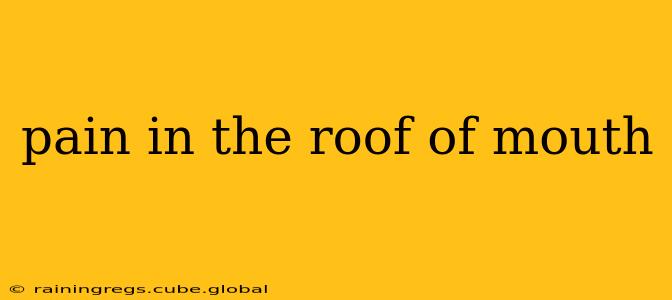Pain in the roof of your mouth, also known as the palate, can be a bothersome and sometimes alarming symptom. This discomfort can range from a mild ache to a sharp, throbbing pain, significantly impacting your ability to eat, drink, and even speak comfortably. Understanding the potential causes is the first step towards finding relief. This comprehensive guide explores the various reasons why you might experience palate pain, along with associated symptoms and effective treatment options.
What Causes Pain in the Roof of My Mouth?
Numerous factors can contribute to pain in the roof of the mouth. The cause often dictates the appropriate treatment, so identifying the underlying issue is crucial. Some of the most common causes include:
-
Mouth sores (aphthous ulcers or canker sores): These small, painful ulcers frequently develop on the soft palate (the back portion of the roof of your mouth) and are often characterized by a burning sensation before the sore appears. They can be triggered by stress, hormonal changes, or minor injuries.
-
Trauma: Accidental biting, burns from hot food or drinks, or injuries from dental work can all cause pain in the palate. The severity of the pain depends on the extent of the injury.
-
Infections: Viral or bacterial infections, such as oral thrush (candidiasis), can lead to painful lesions or inflammation on the palate. Oral thrush is more common in individuals with weakened immune systems.
-
Dry mouth (xerostomia): A lack of saliva can dry out the tissues of the mouth, resulting in discomfort and a burning sensation on the palate. This can be caused by certain medications, medical conditions, or dehydration.
-
Allergies: Allergic reactions to foods, medications, or other substances can trigger inflammation and pain in the mouth, including the palate.
-
Burning Mouth Syndrome: This chronic condition is characterized by a burning sensation in the mouth, often affecting the roof of the mouth, tongue, and lips. The cause is not fully understood, but it's often associated with hormonal changes, nutritional deficiencies, or nerve damage.
-
Oral cancer: While less common, persistent pain in the roof of your mouth, especially if accompanied by other symptoms such as lumps, sores that don't heal, or bleeding, should prompt a visit to a doctor or dentist to rule out oral cancer.
What are the Symptoms Associated with Roof of Mouth Pain?
The symptoms accompanying palate pain can vary depending on the underlying cause. However, some common symptoms include:
- Sharp, stabbing pain: This is often associated with injuries or ulcers.
- Burning sensation: Frequently occurs with dry mouth or burning mouth syndrome.
- Aching pain: May be a symptom of chronic conditions or less severe injuries.
- Redness and swelling: Indicates inflammation, possibly due to an infection or allergic reaction.
- White or yellow patches: Suggests a fungal infection such as oral thrush.
- Difficulty swallowing: May accompany severe inflammation or sores.
- Bleeding: Possible with trauma or oral cancer.
How is Pain in the Roof of the Mouth Treated?
Treatment depends heavily on the underlying cause. Some common treatments include:
- Over-the-counter pain relievers: Ibuprofen or acetaminophen can help alleviate pain from minor injuries or ulcers.
- Topical anesthetics: These can numb the affected area and provide temporary relief from pain.
- Anti-fungal medications: Prescribed for oral thrush.
- Antiviral medications: Used for viral infections causing palate pain.
- Rinses: Saltwater rinses can help soothe and clean the mouth.
- Lifestyle changes: Staying hydrated, avoiding irritating foods, and managing stress can help alleviate symptoms in certain cases.
What if the pain is severe or persistent?
If you experience severe or persistent pain in the roof of your mouth, especially if it's accompanied by other symptoms like bleeding, difficulty swallowing, or lumps, it's crucial to seek professional medical attention immediately. A doctor or dentist can accurately diagnose the cause and recommend appropriate treatment.
Can I prevent pain in the roof of my mouth?
While you can't always prevent palate pain, you can take steps to reduce your risk. These include:
- Maintaining good oral hygiene: Brush and floss regularly.
- Eating a balanced diet: Ensuring adequate nutrition can support oral health.
- Avoiding irritants: Be cautious when consuming hot foods or drinks.
- Managing stress: Stress can exacerbate mouth sores.
- Staying hydrated: Drinking plenty of water prevents dry mouth.
This information is intended for general knowledge and informational purposes only, and does not constitute medical advice. It is essential to consult a healthcare professional for any health concerns or before making any decisions related to your health or treatment.
